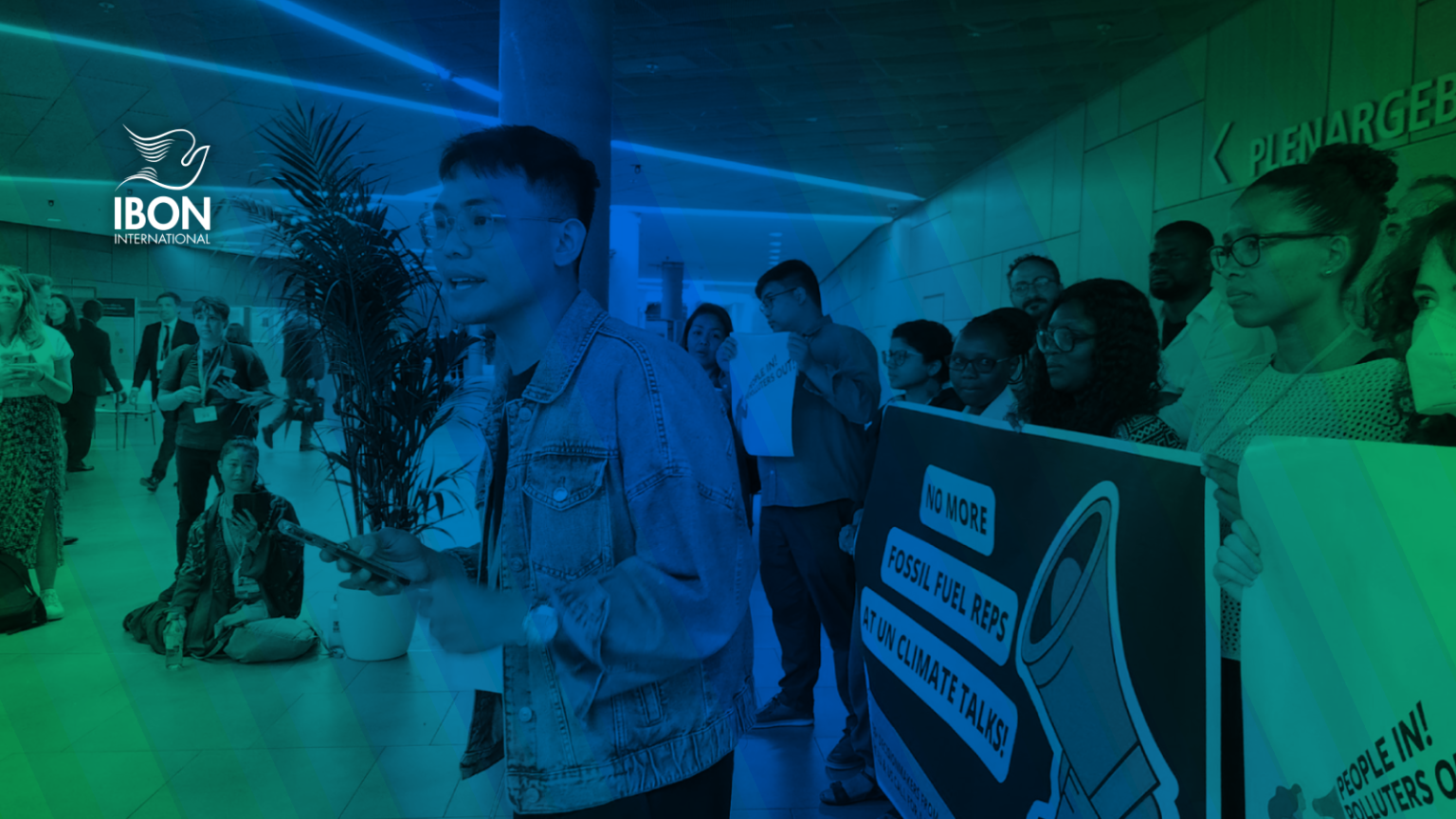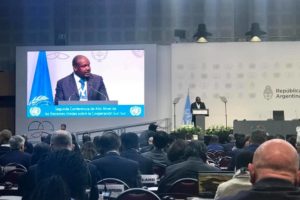From June 5 to 15, the UN Framework Convention on Climate Change (UNFCCC) held the 58th Meetings of the Subsidiary Bodies (SB58) at the World Conference Centre in Bonn, Germany. Its outcomes will be crucial in determining the direction of the 28th Conference of Parties (COP28) this December.
Climate talks in Bonn were on the brink of collapse when countries deadlocked on setting the agenda. Developing countries urged the body to supplement it with an item on financial support if they were to include matters related to the Mitigation Ambition and Implementation Work Programme (MWP), while developed countries opposed the idea. Only on the second to the last day of the conference was the agenda adopted, with the MWP and the item on financial support dropped entirely.
SB58 gave a preview of whether we can expect COP28 to deliver an ambitious outcome. Although the COP28 President Sultan Al Jaber said that the phase down or gradual reduction of fossil fuels was inevitable, he neither provided sufficient information on how this would be achieved nor signified that the plan would be close to an ideal phaseout of all fossil fuels. By the time SB58 ended, concerns about the United Arab Emirates’ (UAE) leadership of the global climate talks had only deepened.
Dangerous distractions from fossil fuel phaseout
Following the alarms raised by climate scientists earlier this year, it was only timely that governments in Bonn talk about the main driver of climate change—fossil fuels. In fact, an important discussion point at SB58 was the MWP, which was set to focus on energy transition. However, while dialogues were tight on renewables, energy efficiency, and electrical grids, at no point did Parties talk about a fossil fuel phaseout.
While there have been plans in the past to wean off coal, Parties have yet to make solid commitments to cut the expansion of oil and gas, all the while promoting dangerous distractions. In a dialogue with youth leaders, the COP28 President said he envisions the target for renewables to triple this year. Some groups cautioned that this may go down the same path of colonial appropriation of developing countries’ resources to feed into developed countries’ energy transition needs.
Techno-fixes and mechanisms like carbon removals, capture and storage, and geoengineering were some of the other ‘solutions’ touted at SB58. Discussions on Article 6 of the Paris Agreement were particularly prominent, pertaining to market and non-market mechanisms that allow for the offsetting of emissions. This faced opposition from climate justice groups that argued this was a false ‘solution’ that would let developed countries evade culpability and continue business as usual.
Negotiations on the rules governing Article 6 mechanisms will continue until COP28. Meanwhile, another round of talks on the MWP is going to happen ahead of COP28. With only a few months before the December climate talks, the question of fossil fuel phaseout is expected to loom larger.
Parties clash over fundamentals of Just Transition
At COP27, parties agreed to establish a just transition work programme (JTWP) on the pathways to achieve the goals of the Paris Agreement. Meetings at SB58 focused on matters that will kickstart the work programme, including its objectives, scope, and modalities, among others.
For developing countries, a just transition must be ensured for workers and communities that have become dependent on the fossil fuel industry. This amounts to creating green jobs, providing social protection, and ensuring that developed countries lead the transition.
On the other hand, developed countries such as the US, UK, Australia, and Japan are pushing for a narrower definition of a “Just Transition,” rejecting notions that international cooperation needs to be part of the JTWP. According to them, transitioning should be a purely domestic endeavour. In simpler terms, they are not willing to provide the necessary financial and technical support that developing countries need to implement their transition pathways.
Much of the crucial discussion on this is expected to shape up at COP28 where countries are also going to adopt the fine print of the work programme. Civil society is categorical that the JTWP must ensure developed countries are not skirting any responsibility to shoulder the transition costs of their developing counterparts.
Slow progress on loss and damage
While SB58 was happening, parts of the globe experienced unprecedented air pollution, wildfires, and tropical cyclones. Climate change is leaving losses and damages in ways that governments in Bonn were refusing to comprehend.
Before heading to Bonn, the Loss and Damage Fund’s (LDF) Transitional Committee[1] was already divided on the quantity and quality of the finance that must flow to and from the Fund. Developed countries continue to insist on their “mosaic of solutions” strategy, which usually pertains to reliance on the private sector’s profit motive to fill the gaps in climate finance. This may include financing from multilateral development banks, insurance programmes, and humanitarian organisations. However, developing countries argued that the LDF must be established as a UNFCCC body, supported by contributions from developed countries based on common but differentiated responsibilities (CBDR) and providing grants rather than loans. The exchange of views at the 2nd Glasgow Dialogue[2] proved no different.
The only formal negotiation on loss and damage at SB58 was the Santiago Network for Loss and Damage (SNLD), a body that is meant to catalyse technical support for vulnerable countries. Up for debate was a decision on the agency best suited to host the SNLD. There were two leading options: the Office for Project Services in the UN Office for Disaster Risk Reduction (UNDRR/UNOPS) and the Caribbean Development Bank (CDB). Both proposals have their shortcomings in terms of scope: UNDRR focuses on disaster risk reduction while CDB is limited in terms of geographical mandate. In the end, parties could not agree on a host for the network. There were also concerns around the finance to make the SNLD functional. Financial pledges for the SNLD made at COP27 remain to be realised.
The forthcoming negotiations in Dubai will be the final avenue for Parties to revisit and negotiate their positions on loss and damage and come to a conclusion. COP28’s success will be contingent on whether Parties reach a consensus on a rights-based and fit-for-purpose funding arrangement that will deliver financial and technical support to frontline communities.
The bumpy road ahead of COP28
Besides the issues around dangerous distractions, just transition, and loss and damage, SB58 revealed concerns that can only impact negatively on COP28. For instance, the appointment of a fossil fuel executive as COP President serves as a glaring reminder of how corporations have crowded out climate talks to legitimise their destruction of the global commons.
Last year, more than 600 fossil fuel lobbyists attended COP27. As a response to growing pressure for a ‘Conflict of Interest’ policy, Simon Stiell, UNFCCC Executive Secretary, held a dialogue at SB58 where he revealed that upon registration, participants must state their affiliations, including who is funding their attendance. This comes with a number of caveats, including the option to opt out of these measures, apart from having little to no repercussions.
While the door swings wide open for corporate interests, civil society anticipates limited participation. Initial concerns revolve mostly around expensive flight tickets and accommodations, visa inequality, and possible political persecution in the UAE.
If COP28 is to be the ‘Action COP’ that leaders are claiming it to be, Parties must take measures to push out all fossil fuel interests and put people at the centre of climate diplomacy. More importantly, they must heed peoples’ demands to end fossil fuels without resorting to false ‘solutions’ and ensure that developed countries contribute their fair share of finance and technology.


